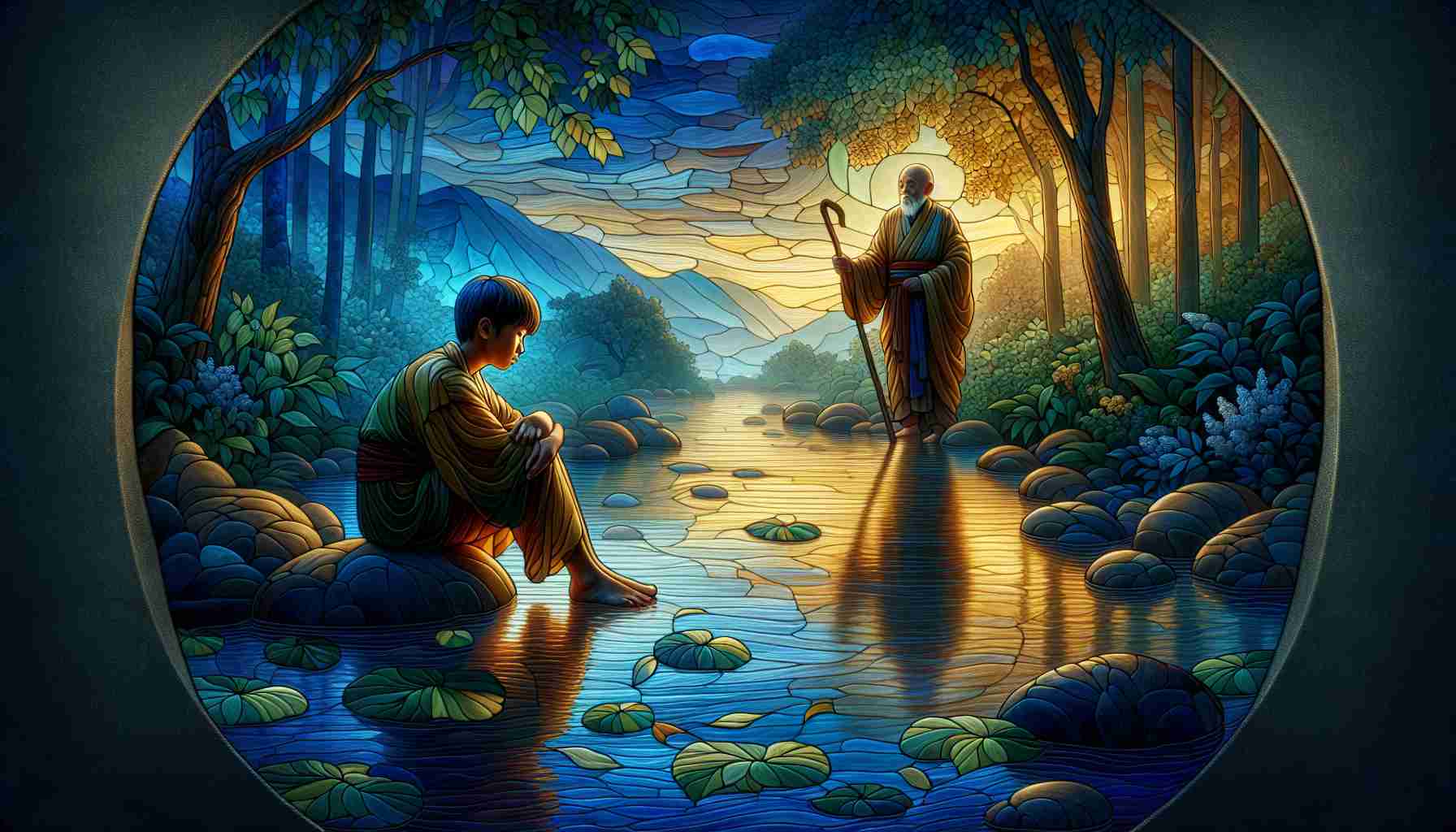

The wind was quiet that morning, and so was I. I sat by the river with my feet dangling in the cool water, watching leaves drift by. I had come to this place, far from my village, because my thoughts were loud and my heart heavy. I was only twelve, but I already believed I needed to be perfect at everything. I tried hard in school, helped my family every day, and still felt like I wasn’t enough.
Grandfather Sheng had always said, “The river does not rush, yet it reaches the sea.” He lived in a small hut near the forest and didn’t seem to care about doing more—just enough. I didn’t understand him.
“I don’t want to waste time doing nothing,” I once told him.
Smiling, he had answered, “Perhaps it is only in doing nothing that we see everything.”
Now, sitting by the river, I wondered what he meant. I reached into the water to grab a floating leaf. It slipped through my fingers. I chased another, then another—but the more I reached, the more they escaped. Finally, I stopped, breathing hard, my hands wet and empty.
That’s when I heard a soft cough behind me. “You are trying to catch the Tao,” said a voice.
It was Grandfather Sheng, walking slowly with his wooden staff.
“How did you know I’d be here?” I asked.
“I didn’t,” he said. “But you did. The Tao guided you.”
I blinked. “I didn’t feel anything guiding me.”
“Did you think hard about coming? Or did you just come?”
“I... just came.”
He smiled. “That is the way of Wu Wei—non-striving. Things happen naturally when we stop forcing them.”
I looked at the river again. Its flow was gentle but steady, smooth over rocks that didn’t move. Even the leaves floated wherever the water took them.
“So,” I said slowly, “if I stop trying so hard… I’ll still get where I need to?”
“Sometimes,” Grandfather Sheng nodded, “working hard comes from fear, not peace. True balance is knowing when to act and when to be still.”
We sat together in silence for a while. A dragonfly skimmed across the surface. I didn’t reach for it. This time, I simply watched.
That night, as we walked back to the village, I felt… lighter.
I hadn’t fixed all my worries. I still wanted to do well in school. I still wanted to help my family. But I didn’t feel like I had to prove something every moment. I could trust that life had its own rhythm—just like the river.
I didn’t change overnight. But now, whenever I feel tight inside, like I have to push and pull to make everything perfect, I pause. I remember the leaves, the river, and Grandfather Sheng’s calm voice.
And I let go—even just a little.
Sometimes, in stillness, I find the Way.
The wind was quiet that morning, and so was I. I sat by the river with my feet dangling in the cool water, watching leaves drift by. I had come to this place, far from my village, because my thoughts were loud and my heart heavy. I was only twelve, but I already believed I needed to be perfect at everything. I tried hard in school, helped my family every day, and still felt like I wasn’t enough.
Grandfather Sheng had always said, “The river does not rush, yet it reaches the sea.” He lived in a small hut near the forest and didn’t seem to care about doing more—just enough. I didn’t understand him.
“I don’t want to waste time doing nothing,” I once told him.
Smiling, he had answered, “Perhaps it is only in doing nothing that we see everything.”
Now, sitting by the river, I wondered what he meant. I reached into the water to grab a floating leaf. It slipped through my fingers. I chased another, then another—but the more I reached, the more they escaped. Finally, I stopped, breathing hard, my hands wet and empty.
That’s when I heard a soft cough behind me. “You are trying to catch the Tao,” said a voice.
It was Grandfather Sheng, walking slowly with his wooden staff.
“How did you know I’d be here?” I asked.
“I didn’t,” he said. “But you did. The Tao guided you.”
I blinked. “I didn’t feel anything guiding me.”
“Did you think hard about coming? Or did you just come?”
“I... just came.”
He smiled. “That is the way of Wu Wei—non-striving. Things happen naturally when we stop forcing them.”
I looked at the river again. Its flow was gentle but steady, smooth over rocks that didn’t move. Even the leaves floated wherever the water took them.
“So,” I said slowly, “if I stop trying so hard… I’ll still get where I need to?”
“Sometimes,” Grandfather Sheng nodded, “working hard comes from fear, not peace. True balance is knowing when to act and when to be still.”
We sat together in silence for a while. A dragonfly skimmed across the surface. I didn’t reach for it. This time, I simply watched.
That night, as we walked back to the village, I felt… lighter.
I hadn’t fixed all my worries. I still wanted to do well in school. I still wanted to help my family. But I didn’t feel like I had to prove something every moment. I could trust that life had its own rhythm—just like the river.
I didn’t change overnight. But now, whenever I feel tight inside, like I have to push and pull to make everything perfect, I pause. I remember the leaves, the river, and Grandfather Sheng’s calm voice.
And I let go—even just a little.
Sometimes, in stillness, I find the Way.